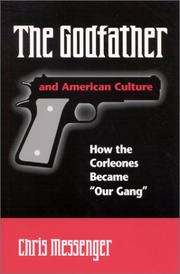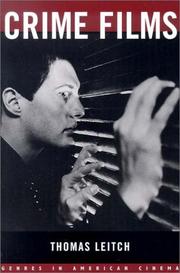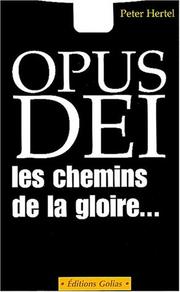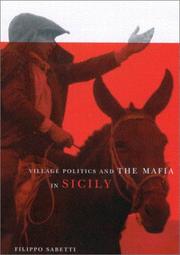| Listing 1 - 8 of 8 |
Sort by
|
Book
ISBN: 8845916758 9788845916755 Year: 2002 Publisher: Milano Adelphi
Abstract | Keywords | Export | Availability | Bookmark
 Loading...
Loading...Choose an application
- Reference Manager
- EndNote
- RefWorks (Direct export to RefWorks)
Mafia --- 82 --- CDL --- Maffia --- Italian literature --- Organized crime
Film
Year: 2002 Publisher: [Paris]: MGM home entertainment,
Abstract | Keywords | Export | Availability | Bookmark
 Loading...
Loading...Choose an application
- Reference Manager
- EndNote
- RefWorks (Direct export to RefWorks)
Un classique toutes catégories confondues. L'histoire rocambolesque de deux musiciens de jazz obligés de se déguiser en femmes et de s'intégrer dans un jazz band féminin parce qu'ils ont assisté au massacre de la St-Valentin.Les rebondissements, les doubles rôles et les doubles personnalités, la reconstitution minutieuse d'une époque et d'une manière de vivre font de "Certains l'aiment chaud" l'une des plus belles réussites de Wilder et un rôle en or pour ses acteurs.
Années 1950 --- Comédie --- Années 1920 --- Mafia --- Etats-Unis
Book
ISBN: 2130524869 Year: 2002 Volume: *8 Publisher: Paris : PUF - Presses Universitaires de France,
Abstract | Keywords | Export | Availability | Bookmark
 Loading...
Loading...Choose an application
- Reference Manager
- EndNote
- RefWorks (Direct export to RefWorks)
Crime organisé --- Crime syndicates --- Georganiseerde misdaad --- Misdaad [Georganiseerde ] --- Misdaadsyndicaten --- Organized crime --- Syndicats du crime --- Organized crime. --- Mafia. --- Mafia --- Crime organisé --- History --- Lutte contre

ISBN: 0791488705 0585471029 9780585471020 9780791488706 079145357X 9780791453575 0791453588 9780791453582 9780791488706 Year: 2002 Publisher: Albany : State University of New York Press,
Abstract | Keywords | Export | Availability | Bookmark
 Loading...
Loading...Choose an application
- Reference Manager
- EndNote
- RefWorks (Direct export to RefWorks)
Mario Puzo's The Godfather is an American pop phenomenon whose driving force is reflected not only in book sales and cable television movie marathons but also in such related works as the hit television series The Sopranos. In The Godfather and American Culture, Chris Messenger offers an important and comprehensive study of this classic work of popular fiction and its hold on the American imagination. As Messenger shows, the Corleones have indeed become "our gang," and we see our family business in America reflected in them. Examining The Godfather and its many incarnations within a variety of texts and contexts, Messenger also addresses Puzo's inconsistent affiliation with his Italian heritage, his denial of the multiethnic literary subject, and his decades-long struggle for respect as a writer in contemporary America. The study ultimately offers a way of looking at the much-maligned genre of popular or bestselling fiction itself. By placing both the novel and films within a number of revealing critical situations, Messenger addresses the continuing problem of how we talk about elite and popular fiction in America—and what we mean when we take sides.
Mafia in literature. --- Families in literature. --- Criminals in literature. --- Italian Americans in literature. --- Corleone family (Fictitious characters) --- Family in literature --- Puzo, Mario, --- Puzo, Mario --- Italian Americans in literature --- Criminals in literature --- Mafia in literature
Book
ISBN: 2874020400 9782874020407 Year: 2002 Volume: *6 Publisher: Bruxelles [lieu de production inconnu] Éditions Mols Imprimerie les Editions Européennes
Abstract | Keywords | Export | Availability | Bookmark
 Loading...
Loading...Choose an application
- Reference Manager
- EndNote
- RefWorks (Direct export to RefWorks)
International relations. Foreign policy --- Political philosophy. Social philosophy --- Europe --- Colloques --- Colloquia --- Crime organisé --- Europa --- Georganiseerde misdaad --- Mafia --- Organized crime --- 343.35 --- #SBIB:39A6 --- #SBIB:39A72 --- -Academic collection --- Crime syndicates --- Organised crime --- Crime --- Maffia --- Etniciteit / Migratiebeleid en -problemen --- Etnografie: Europa --- Delicten en fraude tegen het openbaar bestuur: omkoperij, machtsmisbruik, aanmatiging van functies, aanmatiging van titels, fraude bij openbare leveringen, administratieve fraude, fiscale fraude --- 343.35 Delicten en fraude tegen het openbaar bestuur: omkoperij, machtsmisbruik, aanmatiging van functies, aanmatiging van titels, fraude bij openbare leveringen, administratieve fraude, fiscale fraude --- C8 --- Leman, Johan --- maffia (x) --- Ideologie en politiek --- Crime organisé --- Academic collection --- Organized crime - Europe --- Mafia - Europe

ISBN: 1107128064 0511040288 0511148534 0511556187 0511606451 0511051514 9780511040283 9780511606458 9780511051517 0511036280 9780511036286 9780511148538 9786612389283 6612389281 9780511643118 051164311X 0521641063 0521646715 9780521641067 9780521646710 9780511556180 9781107128064 Year: 2002 Publisher: Cambridge Cambridge University Press
Abstract | Keywords | Export | Availability | Bookmark
 Loading...
Loading...Choose an application
- Reference Manager
- EndNote
- RefWorks (Direct export to RefWorks)
This book surveys the entire range of crime films, including important subgenres such as the gangster film, the private eye film, film noir, as well as the victim film, the erotic thriller, and the crime comedy. Focusing on ten films that span the range of the twentieth century, Thomas Leitch traces the transformation of the three leading figures that are common to all crime films: the criminal, the victim and the avenger. Analyzing how each of the subgenres establishes oppositions among its ritual antagonists, he shows how the distinctions among them become blurred throughout the course of the century. This blurring, Leitch maintains, reflects and fosters a deep social ambivalence towards crime and criminals, while the criminal, victim and avenger characters effectively map the shifting relations between subgenres, such as the erotic thriller and the police film, within the larger genre of crime film that informs them all.
Detective and mystery films --- Gangster films --- Police films --- Cop films --- Crime films --- Bandit gangster films --- Gang films --- Gangland films --- Hoodlum drama (Motion pictures) --- Mafia films --- Organized crime films --- Outlaw-couple films --- Outlaw gangster films --- Rural bandit films --- Syndicate films --- Syndicate-oriented films --- History and criticism. --- Criminal films --- Motion pictures --- Caper films --- Thrillers (Motion pictures)

ISBN: 2914475276 9782914475273 Year: 2002 Publisher: Villeurbanne Golias
Abstract | Keywords | Export | Availability | Bookmark
 Loading...
Loading...Choose an application
- Reference Manager
- EndNote
- RefWorks (Direct export to RefWorks)
267.1 OPUS DEI --- Religieuze verenigingen voor mannen en vrouwen--(alfabetisch)--OPUS DEI --- 267.1 OPUS DEI Religieuze verenigingen voor mannen en vrouwen--(alfabetisch)--OPUS DEI --- Opus Dei --- Alvaro del Portillo --- arme de l'apostolat --- vénération --- Josémaria Escriva de Balaguer y Albas --- 1992 --- octobre 2002 --- églises de la sphère catholique --- l'Eglise catholique --- endoctrinement --- obéissance --- Pape Jean-Paul II --- censure --- flagellation --- enrôlement des jeunes --- séparation des hommes et des femmes --- la sainte Mafia

ISBN: 1282860879 9786612860874 077357073X 9780773570733 0773524754 9780773524750 Year: 2002 Publisher: Montreal Ithaca McGill-Queen's University Press
Abstract | Keywords | Export | Availability | Bookmark
 Loading...
Loading...Choose an application
- Reference Manager
- EndNote
- RefWorks (Direct export to RefWorks)
He suggests that the mafia emerged only in some parts of Sicily and was never a single overarching criminal organization. It arose, in fact, from a self-help tradition that eventually became corrupted and ultimately a burden on most villagers - land workers and proprietors alike. The local antimafia forces also became a drain on village life and by the middle of the 1950s both the mafia and the antimafia, far from destroying one another, had vanquished themselves. The first study to extend rational choice institutionalism to Italian history and politics, Village Politics and the Mafia in Sicily offers an in-depth analysis of the impact of the abolition of feudalism in 1812, the unification of Italy in 1860, and subsequent regime changes on village politics in Sicily. Sabetti details the emergence, evolution, and collapse of a local mafia and antimafia in a historical, "before-after," perspective. Refocusing the study of village politics and the mafia, he also suggests what can happen when those acting for the state regard ordinary people as passive voices in the game of life.
Local government --- Political participation --- Mafia --- Power (Social sciences) --- Empowerment (Social sciences) --- Political power --- Exchange theory (Sociology) --- Political science --- Social sciences --- Sociology --- Consensus (Social sciences) --- Citizen participation --- Community action --- Community involvement --- Community participation --- Involvement, Community --- Mass political behavior --- Participation, Citizen --- Participation, Community --- Participation, Political --- Political activity --- Political behavior --- Political rights --- Social participation --- Political activists --- Politics, Practical --- Local administration --- Township government --- Subnational governments --- Administrative and political divisions --- Decentralization in government --- Public administration --- Sicily (Italy) --- Social conditions.
| Listing 1 - 8 of 8 |
Sort by
|

 Search
Search Feedback
Feedback About UniCat
About UniCat  Help
Help News
News